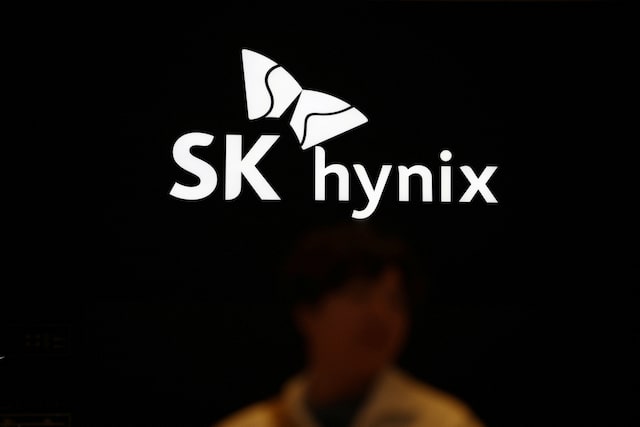The logo of SK Hynix is seen at its booth during The 26th Semiconductor Exhibition (SEDEX 2024) in Seoul, South Korea, October 23, 2024. REUTERS
Summary
- Q1 profit more than doubles to $5.2 bln, handily beats forecasts
- No change in high-bandwidth memory chip sales plans
- Profit lifted by soaring AI chip demand, stockpiling ahead of potential tariffs
SEOUL, April 24 (Reuters) – SK Hynix a key supplier of high-bandwidth memory processors to Nvidia said quarterly profit more than doubled and demand for AI chips was so robust that it expects only limited impact on those products from potential U.S. tariffs.
Washington has launched an investigation into semiconductor imports, arguing that extensive reliance on foreign production is a national security threat.
There have also been concerns that increased U.S. export controls on chips to China, which have resulted in a $5.5 billion hit to Nvidia, could harm SK Hynix.
“Regarding our HBM business, what we can clearly state is that there has been no change to our sales plans for this year to key customers, which remain in line with the levels set in previously signed contracts,” Kim Ki-tae, the company’s head of HBM sales & marketing, told an earnings briefing.
While it expects some volatility in demand for smartphone and PC chips, SK Hynix’s relatively upbeat estimate of limited pain from U.S. tariffs echoes a bullish outlook from TSMC (2330.TW), the world’s largest contract chip maker and another big beneficiary of the AI boom.
SK Hynix logged its second-highest quarterly operating profit ever in the first quarter with a 158% jump to 7.4 trillion won ($5.2 billion), boosted by strong AI-related demand and stockpiling of smartphone and PC chips ahead of potential increases in U.S. tariffs.
That handily beat a 6.6 trillion won LSEG SmartEstimate, which is weighted toward more consistently accurate analysts.
Revenue soared 42% to 17.6 trillion won.
Some analysts have expressed worries that advance purchases and stockpiling across the industry seen in recent months could lead to weaker demand in the second half.
But SK Hynix said that scenario seemed unlikely, given the current limited visibility into how tariffs would pan out.
“It’s unlikely that pull-in demand will rise significantly enough to trigger concerns about inventory buildup,” said Kim Kyu-hyun, head of DRAM Marketing.
SK Hynix said it expects spending by big tech firms on server chips to continue as they seek to capture early opportunities in the artificial intelligence market.
In smartphones, the advancement of AI features in new models is expected to drive replacement demand, boosting sales of high-performance mobile DRAM chips, it added.
It is also not that exposed to U.S. tariffs. The company said while U.S. customers account for 60% of its total revenue, it ships most of its products to non-U.S. countries. Apple (AAPL.O), makes iPhones in China and India, while Nvidia makes AI server products in Mexico and Taiwan.
SK Hynix also noted that the low-cost AI models developed by China’s DeepSeek will lead to lower entry barriers and more competition in the AI industry, boosting demand for high-density memory chips.
The company has been leading a global race to meet explosive demand for HBM chips, a crucial component of chipsets made by the likes of Nvidia that help process vast amounts of data to train AI models. It is the main HBM chip supplier to Nvidia as cross-town rival Samsung Electronics (005930.KS), has struggled to keep up.
SK Hynix shares, which surged by a fifth in value last year, were down 1.2%, underperforming the benchmark KOSPI’s (.KS11), 0.5% fall.
Reporting by Heekyong Yang, Joyce Lee and Hyunjoo Jin; Editing by Miyoung Kim, Himani Sarkar and Edwina Gibbs





